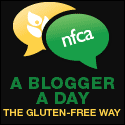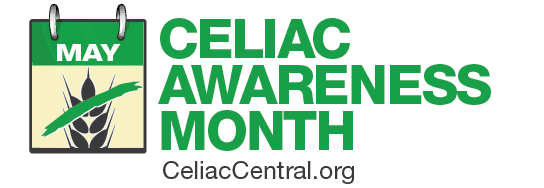In 2003, Alice Bast founded the National Foundation for Celiac Awareness (NFCA). She turned a life of illness, heartbreak, celiac diagnosis, and subsequent recovery into an award-winning organization that changes lives. I’ve shared Alice’s personal celiac story often because it involves celiac symptoms often tragically overlooked—infertility, miscarriage, stillborn birth, and a child with an extremely low birth weight. As a gluten intolerance and celiac support group leader, I hear many similarly tragic stories, both from individuals directly and from family members and friends of those affected. Usually, it’s people who know about the connection between ob/gyn issues and gluten who are sharing the stories with me in frustration. I can count the number of times on one hand that those who have suffered these symptoms have had their physician cite celiac disease (on non-celiac gluten issues) as a possible cause. Even when there is a history of celiac in the family. Even when there are other symptoms of celiac disease present. Even when the tragedies of infertility, miscarriage, stillbirth, and non-thriving babies are repeated again and again. Even when a knowledgeable relative or friend gets the patient to inquire about the possibility of celiac disease or a gluten connection. Almost every single time, the possibility is of celiac is not offered (or dismissed) by the physician and celiac testing is not done. If this situation is one you’ve experienced, demand celiac testing. I’d go even further to say that if celiac testing is negative, still eliminate gluten from your diet. Remember that a recent study showed that gluten sensitivity is real and affecting far many more millions than celiac. Together these conditions affect at least 21 million people. While gluten sensitivity is still associated with less severe reactions to gluten with no damage, respectfully, I believe much more is to come on that subject. (I’m sure many of you who do not have a celiac diagnosis, but still live—and thrive—gluten free would agree.)
The NFCA offers a wide array of resources for all. I’m going to give you a “rundown” on some of them because I feel you really need to know what’s available to you through this excellent organization.
Think you may have celiac? Complete this symptom checklist, print out the results, and take them to your doctor. Don’t stop at completing the checklist before you head out the door though. Gather your “ammunition.” Head over to one of my very favorite parts of NFCA’s website—the Personal Stories. The stories are categorized by symptoms (e.g. Pregnancy and Fertility Issues, Headaches, Child Development, Osteoporosis), so you can quickly read the stories of those who have experienced the same symptoms as you. There are many, many stories and all are worth a read. One that I’ve shared time and time again is Allison’s story because it shows the damage that consuming spelt can quickly do to someone who is gluten free. Alison’s story also shows how rapidly the consumption of gluten can debilitate a person, even a previously energetic, athletic teenager. Even if you have been given an explanation of your condition previously by your doctor, like “you’re older; osteoporosis is a given,” “migraines run in your family,” or simply, “you’re anemic” with no explanation, read the stories and print out the ones that you can identify with. Highlight the parts that speak to you and take them to your doctor with the completed symptoms checklist.
What else should you check out on the NFCA’s website? Related Diseases can be eye opening. People with related diseases should always be tested for celiac, but often they are not. If you have one of the diseases shown, again, demand testing. We demand a refund when the cashier at the grocery store charges us the regular price for a sale item. If the cashier balks, we persist. Yet we often do not “persist” with our doctors because they are authority figures. In short, we often don’t demand the best health care for ourselves. The fact is the doctor is working for you and you can “fire” him/her, but before you go that far, gather your “ammo” and attempt to educate as you demand what you need. Most doctors really do want to help you get well, but many remain uninformed on celiac disease and non-celiac gluten issues as well.
As a group leader and community speaker, I frequently call upon the NFCA for handouts for community presentations. The NFCA has graciously sent me dozens of handouts that I’ve shared with folks trying to determine if they have gluten issues and others new to the gluten-free diet. For you, they have a page of Printable Guides. Some of these may also be used as a way to communicate with your doctor and get what you need as a patient experiencing symptoms. NFCA even has a program now to educate health care professionals, including primary care physicians. You are even given the materials to convince your physician to pursue this education on celiac.
Get up to speed on the Facts and Figures of celiac disease here. If you need more in-depth information on a topic or specific support, check out NFCA’s live webinars. They cover a wide array of topics to help the gluten-free public. For example, there’s one for the person who is 60 and over, another for the gluten-free teenager heading off to college, and another on successfully being gluten free during the holidays. You can sign up to join them live or you can view them at your convenience as all are archived on their website.
I’m also a big fan of the NFCA’s newsletter, which keeps me up to date on the different programs and resources they offer, as well as shares recipes and tips for gluten-free living. Anyone can subscribe!
Be sure to read more on what the NFCA has been up to and where they’re headed. In this video, Alice Bast talks about “Gluten-Free in the Mainstream,” including upcoming medical advances (some of which are inspiring lengthy discussion for sure). Here’s another video below that was created after Alice won the Philadelphia Award. Note that this last video, which you can click on below, starts three minutes “in” beginning with Alice sharing her personal story. You can also see the full video here.


Kay Guest says
As always, the best information that is the most helpful! Thank you for all the links listed here.
And thank YOU for all your hard work!
Kay
Ricki says
Another incredibly informative post, Shirley–thanks. I think many people don’t realize that gluten intolerance hits many people who *don’t* have celiac. And I loved that interview with you! 🙂
Tina @madame gluten-free vegetarian says
Hi Shirley!
As someone who was diagnosed with two other autoimmune diseased before finally being diagnosed with celiac disease, I’m so glad you took the time to write your post today. I hope that it will reach many people outside the gluten-free community so that people (like me) who had no idea that gluten could cause so many health problems will discover what may be the answer to their questions.
All the doctors I saw never mentioned the possibility of celiac disease or gluten intolerance. I hope that as awareness spreads, there will be fewer stories like Alice’s, or mine.
Great job, Shirley! Hope you have a wonderful weekend — Tina.
Shirley says
Hi Tina–Thanks so much for sharing your experience and offering the kind words! Please spread the word. We are all like gluten-free ambassadors trying to save others from experiences like all of ours. Some are far more tragic than others (I can’t imagine anything being more devastating than the loss of a child), but all are unnecessary when the cause is gluten. I read the other day that it’s estimated that 50% of cases of celiac will be diagnosed by 2018. I suppose if one looks at that stat via the “glass half full” thinking, it’s a good thing. But that’s 7 years from now and at the rate we’re going I really wonder, plus 50% still leaves half undiagnosed. I’m convinced that personal stories and our gluten-free ambassadors can get the numbers up. It’s true that testing is only highly accurate for those with complete villous atrophy, but just getting folks tested would be a huge step. After that, we can work on the need for/benefits of going gluten free if one has symptoms even if the test is negative.
Thanks so much for taking the time to comment, Tina! Hope you have a wonderful weekend, too. 🙂 Mine has already started out very well. 😉 Hugs,
Shirley
cheryl says
as always, a great, comprehensive post on a vital topic, Shirley!
Have a lovely weekend.
Shirley says
Hi Cheryl–Thanks, dear! It’s great having you in my corner. 😉 I’m so excited about your new celiac videos being up on your Harris Whole Health site! I know they will be a great resource for all. Bravo, my dear, bravo! 🙂
My weekend has gotten off to a great start, thanks! Hope yours is wonderful, too. 🙂
Shirley
Kim (Cook IT Allergy Free) says
As someone who does not have Celiac Disease, but did have more miscarriages than I can count on one hand, I totally relate to how gluten can affect fertility. It was not until I was totally gluten free that I had a healthy pregnancy with my second son. Alice has an amazing story and she has done something even more special because of it. Thank you so much for sharing her journey here! 😉 As usual, your posts are so crucial to sharing the most important info!
And congratulations on being featured on NFCA!! 😉 That is awesome!
Shirley says
Hi Kim–Every time I hear your story, my heart wrenches at the losses you’ve experienced. I’m so glad that you have those two beautiful boys now as result of your family’s gluten-free path. It was a treat being featured on the NFCA site as I so respect the work they do. Alice is indeed amazing and has led the NFCA to be such a critical organization to those of who need to be gluten free.
Thanks so much for sharing your own tale of heartbreak and recovery, Kim. I can’t imagine how difficult it is to share it … even now. xoxo,
Shirley
Ina Gawne says
Shirley, bless your heart! This is such a good, good post! Thank the heavens for people like you….we need all the more “yous” we can get in this world!
Shirley says
Hi Ina–Gosh, thank you, dear! But know that we are all doing our part in spreading the word. Every time you share this post or similar ones (from me or others), write a blog post yourself, tell a friend about the symptoms of celiac/gluten intolerance, share gluten-free food, etc., you are doing your part … so thank you, too!
Hugs,
Shirley